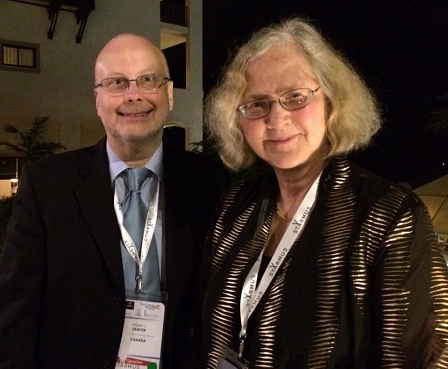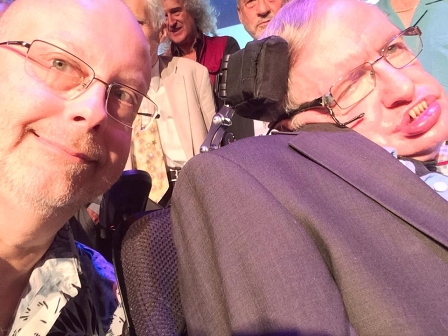Erstellt am: 29. 10. 2016 - 09:03 Uhr
An Interview with Robert J Sawyer (Starmus)
FM4 Reality Check
Tune in today for an FM4 Reality Check Special, to hear some of our futuristic conversation with the Hugo & Nebula Award-winning science-fiction author, Robert J Sawyer.
(Afterwards, check back here for the podcast!)
Saturday, October 29th, 12-13, and after that seven days on demand.
This year, I attended a magnificent space, science and music festival / conference called Starmus. It is superficially a bit like TEDTalks, but in fact it is quite a different beast. Instead of people coming with inspiring ideas, you have experts in physics, astronomy, and other scientific fields giving lectures and holding round-table discussions about space and the future. If that weren't enough, the event also features concerts from the likes of Hans Zimmer, Brian May, Commander Chris Hadfield and others.
I attended the event as a journalist and had the opportunity to speak with many of the most amazing, visionary space people alive today. One of those people was the Canadian science fiction author Robert J Sawyer.
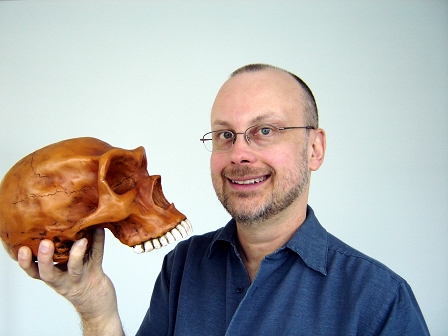
Carolyn Clink
* - The Order of Canada is a medal which recognizes outstanding achievement, dedication to community, and service to the nation.
Despite his popularity, I'd never heard of Mr. Sawyer before this year's Starmus, which is weird: Robert has written well over twenty well-received books, and won awards such as the Hugo and Nebula prize. On the day I met him (not that he said a word about it; I found this out from someone else later!), he was even presented with the Order of Canada*.
I came prepared for the interview with what you could call "standard issue" science fiction-related questions. These include questions related to the future of artificial intelligence, how science fiction has already influenced technology and popular culture, his own vision for the future, and how that future differs from some of the other prospective futures on offer.
He knocked the ball out of the spaceship, with every one of his answers. I don't know if anyone's ever managed to blow me away so thoroughly with their ideas, as Robert J Sawyer did in our short hour together.
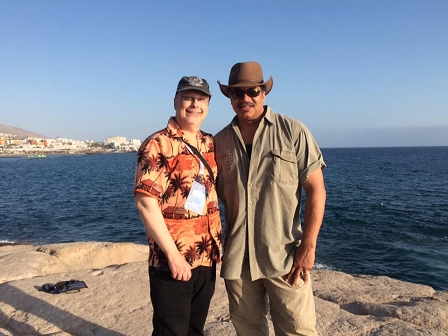
Robert J Sawyer, 2016
RJS on the future depicted in 2001: A Space Odyssey
"I knew by the time I was twelve years old, before I was even a teenager, that something had gone horribly wrong with this vision of an ongoing human presence in space. We were abandoning it."
"[With the International Space Station,] we are clinging to just outside the atmosphere, and that was not the vision in 2001. That said, 2001 depicted a world in which everybody was white. There’s not a single person of colour in that film. [They depicted a world] in which the only woman who has any significant role is a Soviet woman, because they were allowed to be manly and have job, but Americans, Brits, none of the others in the film had any significant role. They were telephone operators, flight attendants! Not to denigrate those professions, but they weren’t there being the scientists and the engineers, and the astronauts. So we lost out on one part of the future, but we gained a future that’s WAY more inclusive than Clarke and Kubrick ever depicted. On balance, we probably got the better future."
RJS on uploading your consciousness onto a hard drive
"We come to a question of what is personhood. If you make multiple copies, the idea that you could upload me into one android body, means that you could upload me into an arbitrary number of android bodies, a hundred, a thousand, a million of them, if you were so inclined."
"So which one is Robert J Sawyer? Who owns his house? Who gets to vote in the election? If we scan my brain and upload it into the android body, does that token move with me to the android body?"
"We’ll probably have legal documents that you will sign, that say I recognize that my mortal body is still going to exist, with a working consciousness once you upload me, but I hereby transfer – as a legal document – who I am to that new version. And it will have to be done, just as we make these choices now at the termination of life, with clarity of mind [and] deliberation of intent, and your family agreeing to it."
RJS on the kinds of Artificial Intelligence that may emerge
"We tend to be afraid in science fiction of the notion of artificial intelligence. We have three basic scenarios: we have the Terminator scenario where it will wipe us out, we have the Matrix scenario where it will subjugate us, and we have the BORG scenario where it will assimilate us, but we have very few scenarios where we as humanity survive with our individuality, liberty, and dignity intact. But all of those rapacious goals that we’ve ascribed to artificial intelligence come from our own psychology, [which] is the direct result of four billion years of Darwinian red-in-tooth-and-claw evolution."
"An artificial intelligence that emerges spontaneously doesn’t emerge out of that competitive environment that gave rise to us, and has no particular reason to think that it is mortal and has to fight for resources. An AI could live an infinite amount of time, as long as it’s kept having resources, power, and so forth. It wouldn’t necessarily feel that it had a short constrained lifetime, [and that] it had to create progeny that are going to be its spiritual successors. The Darwinian engine made us nasty. Artificial intelligence comes from an economy of abundance! If I’m reading a document, and you want to read it, you don’t have to take it from me, which is the mindset that you and I would have [in Darwinian terms]. I will simply give you a copy, and you a copy, and you a copy, an infinite number of copies. Any resource that anybody wants is infinitely reproducible!"
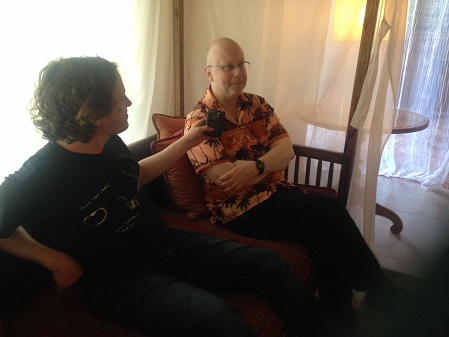
Ilya Baykin
RJS on why he bases so many of his books in Canada
"I’m not generally given to conspiracy theories, but [the] systematic suppression of knowledge about Canada in the United States is astonishing to me. It becomes apparent that the rhetoric in American political discourse for the last several decades doesn’t hold water, if you can simply point right next door and say ‘no, no, you’re wrong about socialized medicine, it works. You’re wrong about gun control, it works. You’re wrong about environmentalism, it works.' All of these things that Canada takes as the routine backdrop of our lives are contrary to the narrative the United States wants to promulgate."
"From a science fictional point of view, all those positive things that I’ve just enumerated are so important that the world see, that I find it very, very necessary [...] to set my stories in Canada. Canada is the bridge of the Enterprise, writ large. It is this multicultural environment where everybody comes to the table with dignity. To show that these examples really exist, is part of my mission, not just as a science fiction writer, but as a citizen of this planet, to say, ‘here’s what we’re doing, and you can do it too.’"
RJS on why it's important to imagine brighter futures
"The future is where I’m going to spend the rest of my life, so I’m hoping it’s going to be a bright and sunny place. Generally, I’m very optimistic. That said, every once in a while, you get knocked for a loop. Brexit knocked me for a loop. If Donald Trump becomes President of the United States, [that] will knock me for a loop. But in aggregate, the world is a better place now, in 2016, than it was when I was born in 1960.
"On balance, my vision of tomorrow is that it’s a brighter, better place than today. If we only have the dystopian visions, if we only have the world where we’re subjugated by machines, or where ecological disaster or biological warfare destroys us, that’s the only future people can dream of, if it’s the only one on the table. So it’s a necessity that there be at least a handful of positive voices, who suggest that the future can be utopian instead of dystopian. I’m hoping that, with that additional voice that we bring to the table, that humanity collectively will say, ‘oh, there are bright futures too, that we could choose to pursue’, and perhaps we will."
Starmus on FM4
Read my articles about the Starmus science and arts festival in 2014 and 2016.
Special thanks are due to Garik Israelian and the Starmus team for putting together the amazing Starmus festival, without which I wouldn't have met Robert J Sawyer or any number of other amazing people this year.
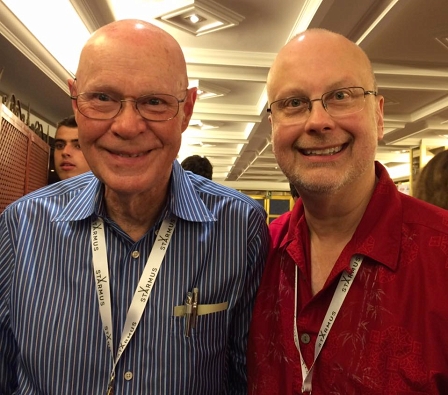
Robert J Sawyer, 2016
A FM4 Reality Check Saturday Special on Saturday, October 29
If you miss the program, you can still stream it via the Reality Check podcast or at fm4.ORF.at/7tage.



